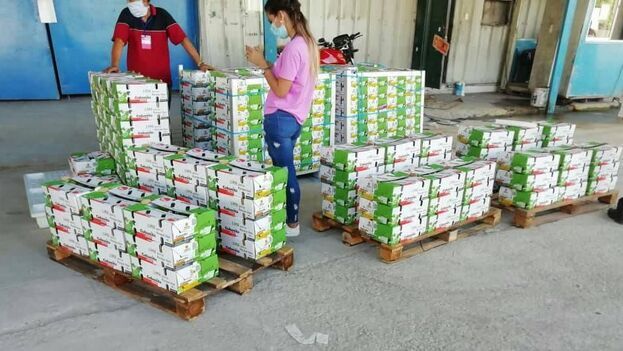
![]() 14ymedio, Mercedes Garcia, Sancti Spiritus 23 February 2023 — “To say I am irritated is an understatement. I’m as hot as a bonfire,” says Luis Mario Godinez, who with his father and brothers produce charcoal from marabou weed in Cabaiguán, a town in Sancti Spiritus province. The family has been waiting for more than four months to be paid the hard currency they are owed for their product, which was sold for export.
14ymedio, Mercedes Garcia, Sancti Spiritus 23 February 2023 — “To say I am irritated is an understatement. I’m as hot as a bonfire,” says Luis Mario Godinez, who with his father and brothers produce charcoal from marabou weed in Cabaiguán, a town in Sancti Spiritus province. The family has been waiting for more than four months to be paid the hard currency they are owed for their product, which was sold for export.
“We did everything we were supposed to do. We delivered a high-quality charcoal, and delivered it on time, but we still have not gotten the hard currency payment we were promised,” says Godinez. He blames Cubaexport, a state-owned company that he describes as “the bottleneck where the money is stuck.”
In June 2020 the government began allowing privately owned companies and cooperatives to export goods they produced provided they did so through state-owned companies. Just two years later small and medium-sized private companies got the go-ahead to sell technology and energy-related services directly to overseas customers.
Since then official media outlets have reported extensively on farmers who export lemons and avocados to European markets but have said little about payment delays by government intermediaries.
“For God’s sake, just pay us,” implores a producer in Santo Domingo, a town in Villa Clara, who went through a state-owned company, Frutas Selectas, to export his mangos and citrus fruits. “They’ve been telling us it will get here soon but we haven’t seen the money.”
One farmer explains, “There’s a lot of frustration because no one has explained what’s going on. Some say the Ministry of Economy and Planning has put a stop on MLC* payments but no one has come here and explained that to us directly. I’ll begin harvesting again in a few weeks but, if this doesn’t get resolved, I don’t think I’ll be exporting again.”
Frutas Selectas is the same company that, three years ago, announced with great fanfare that a Cuban farmer had exported his lemons to Spain. At the same time 14ymedio confirmed that the fruit never made it to Spanish stores.
“My customers are extremely upset,” admits an employee of Commercio, who asked to remain anonymous. His company handles shipments of honey, charcoal and fruits from privately owned farms and state-owned companies that export their products. “Over and over they deliver what they produce but they don’t get paid,” he says.
“And it’s not just happening to private producers. State companies are also not getting paid or are seeing export agencies delay paying them the hard currency they are owed,” he says. Among the companies most affected are Apicuba, which is involved in honey production; La Estancia, whose focus is juices and jams; Tenpiel, a tannery and leather producer; and Empresa Pesquera, a fishery.
“We’re the ones who have to face private producers and state-owned companies to tell them they’re not getting paid because there’s no hard currency,” says the Commercio employee. “This isn’t a new problem. These delays have been going on for more than four months.”
The situation is the same in Cienfuegos province. The Plasencia brothers supply mango to the Arimao Citrus Company, which became the province’s “premier exporter” three years ago when the Ministry of Foreign Trade adopted new rules allowing private farmers to place their products in overseas markets, provided they went through official channels
After delivering tons of mangos, to be made into pulp for export to Europe, the family says it has yet to see a single MLC. “The process is very complicated,” explains Victor, the younger Plasencia brother. “We’re waiting to be paid what they owe us so we can buy a new water pump for the farm.”
“We’ve been told the priority now is to use MLC to pay the tobacco farmers,” he says. “To make matters worse, in addition to not paying us, they now want to charge us in MLC for many of the things we need to operate. But if we never manage to get our hands on hard currency, what are we supposed to do?”
“The opinion of most farmers in this area of the state agencies is negative,” he adds. “We believe they’re unnecessary, slow and very bureaucratic. Some even call them parasites. The question everyone is asking is: Why can’t producers export directly? Why can’t we have more autonomy and control the profits we make from selling our products in Spain or Australia?”
On one thing the Plasencias are adamant: “Next time we’re going to sell our mangos in Cuba. We’ll make less money, and we’ll be paid in pesos, but at least we’ll be paid something.”
* Translator’s note: Spanish-language initials for “freely convertible currency” (moneda libremente convertible, or MLC). A digital Cuban currency pegged one-to-one to the U.S. dollar.
____________
COLLABORATE WITH OUR WORK: The 14ymedio team is committed to practicing serious journalism that reflects Cuba’s reality in all its depth. Thank you for joining us on this long journey. We invite you to continue supporting us by becoming a member of 14ymedio now. Together we can continue transforming journalism in Cuba.
